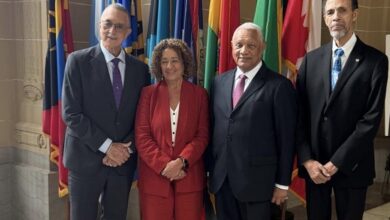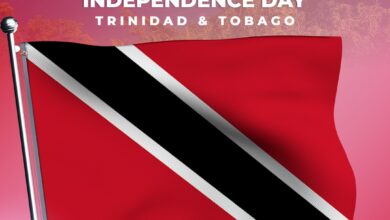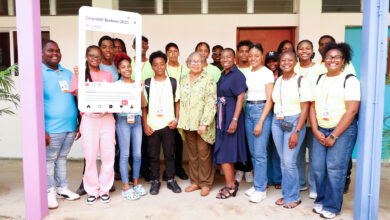(CARICOM Secretariat, Turkeyen, Greater Georgetown, Guyana) I must first apologise for the absence of H.E. President Desiré Delano Bouterse, President of the Republic of Suriname. President Bouterse deeply regrets his absence.
Within the context of the broader topic “The Future of the ACP Group In A Changing World: Challenges and Opportunities”, I have today been asked to deputise for President Bouterse. I must confess that those are some large shoes to fill. The topic of my contribution is “The Future of Development Finance And The Post-Busan Global Partnership.”
The Barbados delegation is truly appreciative of the kind hospitality extended to us by the Government and people of Equatorial Guinea. As I look out to the ocean daily, I am reminded that there is nothing between this country – and indeed the west coast of Africa – and my country. Barbados is the most easterly of our CARICOM sister islands.
It is clear that the developments of the last five years have transformed the global landscape. We have witnessed the catastrophic consequences of the financial and economic crises. These have brought a level of economic, social, and political dislocation not witnessed in a hundred years. It has come at a time when many countries of the ACP have been forced to grapple with the growing negative impacts of climate change. Taken together these two phenomena, an ongoing economic catastrophy and the unfolding dangers of climate change, have rendered many ACP states Vulnerable.
As developing nations we have nevertheless endeavoured to abide by the rules of international engagement. Our participation in the Doha Development Round is illustrative of our commitment. The inability to complete these negotiations does not augur well for the ACP.
Beyond these, we must recognise that any discussion of the future of Development Finance must accomodate an assessment of the resources needed to address the issue of peace, security,good governance and indeed development. Together we face as regions the insecurity occasioned by ethnic, political and religious strife, illegal trafficking in drugs and arms. These several forces together create a demand for significant resources: financial, human and technological.
Traditionally we were able to access a diverse mix of development assistance. Changing circumstances, positive and negative, have created both threats and opportunities to the ACP.
THREATS
• As mentioned previously the continued impact of the global economic crisis on our key development partners and on our economies has called into question the ability to maintain current and future development finance commitments.
The changing composition of the European Union (EU). The membership of the EU continues to grow. New members who have had no previous relationship with ACP countries and who are also less developed that the early members of the EU (Western Europe), question the preferential arrangements which characterised ACP-EU relations.
The present situation of our partner, the EU, is one of an existential struggle. They are facing many of the issues we have been grappling with since our independenbce: high debt and high enemployment, and very dim prospects for their populations in many member states. Concerns about the wellbeing of their populations are very real.
• The Graduation of many member states of the ACP: The EU’s New Development Policy, and indeed many multilateral agencies have introduced the concept of Graduation, thus excluding the graduated from significant development finance resources. Such classification does not recognise the true VULNERABILITY of many of these countries, in the Caribbean and the Pacific in particular. We know that a single catastrophic event can destroy the economies of these small island developing states (SIDS).
The EU needs to seriously rethink this strategy of graduation and work with these countries. SIDS like Barbados cannot be evaluated solely on the level of our per capita GDP. We are small island open economies that are challenged by climate change, and highly indebted. Such open economies are vulnerable. In the context of the ACP Group, most affected by this graduation are countries like Barbados in the Caribbean, and the Pacific islands. The EU needs to engage countries in a real dialogue about their development and the best way they can work together.
OPPORTUNITIES
On the other hand there are some opportunities created by recent global developments:
• Continued rise in commodity prices
• The growing demand for commodities, especially among the members of the BRICS.
• The several successes in the development efforts of some ACP countries.
Together these opportunities must inform our efforts to mobilise and utilise development finance in the future. It is our expectation that the EU will honour its commitments to the ACP.
We cannot rely on our developed partners alone. The long held view of collective action which characterised our societies of old, must inform our internal efforts to shape our own development efforts. Together we control critical resources: people, natural resources and in many places significant financial rsources. Many member states have established traditions of sound regulation and good governance. What we need is the commitment and indeed the will to deploy these across the ACP for our development.
Our development efforts must be financed from multple sources: Public/Private; Bilateral/Multilateral . The application of this must be at the National/Public Sector – where the focus must be on the necessary infrastructural development. The private sector must be supported in a way that ensures the expansion of ownership, indigenous entrpreneurship and employment generation.
This must also be ulitised within a framework and context of full transparency and good governance. It must be citizen-centered and intended to ensure citizen security in all its facets.
In summary, consistent with the Post-Busan Partnership, we must strive for an ACP Partnership characterised by:
• South-South/Triangular Cooperation
Expanded South-South Cooperation, in light of declining aid from countries of the north, will serve to mitigate the impact of declining grant aid from traditional sources. Increased focus will be placed on countries like China, India and Brazil as sources of aid. Pursuance of that strategy will expand the scope for CARICOM in respect of its resource mobilization efforts. Enhanced peer learning will deepen the scope for South-South Cooperation.
• Private Sector Involvement
The Busan document seeks to promote partnerships involving the national (regional) private sector and foreign private sector. If pursued vigorously in CARICOM, levels of foreign direct investment, levels of production and jobs would be directly impacted. The document also promotes public/private partnerships through which public finances could be leveraged to promote increased levels of private sector investment with similar results. Such a strategy is consistent with CARICOM priorities on increased investments, job creation and production for export.
• Mutual Accountability, Use of Public Financial and Procurement Systems
All CARICOM States, at one level or another are engaged in public sector reform which involves transparency, public sector financial management and procurement systems. Post-Busan arrangements seek to use these reformed national systems for aid delivery based on nationally set priorities. Reform as part of aid conditionality ought not to impact negatively on CARICOM States since most have either already reformed or are engaged in reform based on global best practices.
• Other elements of the Busan document having direct significance to CARICOM Member States include:
• Use of Regional and National Results Frameworks (based on national plans and strategies);
• Improved generation of statistics to support the planning, monitoring and evaluation processes; and
• Increased collaboration among Regional Organisations where regional institutions can assist their respective regions and member states to meet their Busan commitments as is likely in CARICOM as a result of the reform process which has already been initiated.
CARICOM stands ready to work with our ACP partners in these areas.
I Thank you.





